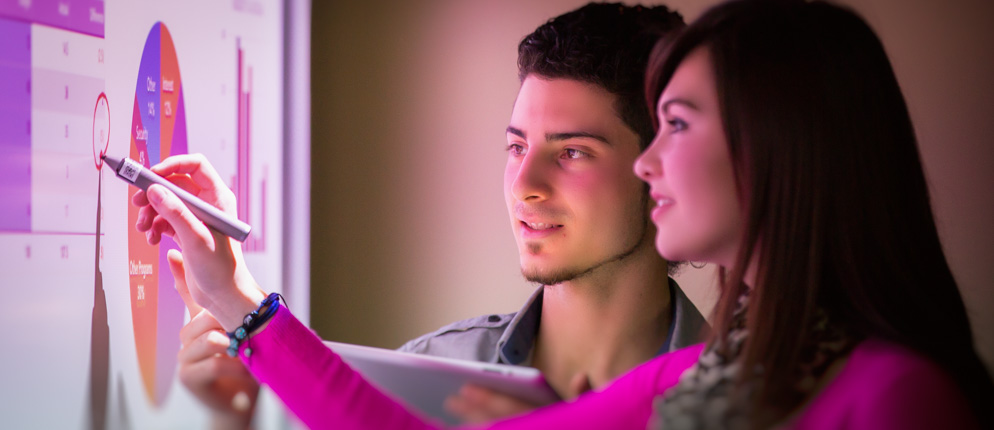- Future Students
- Current Students
- Faculty
- Staff
- Alumni
- Others
UofGH students get real-world research experience

Students at the University of Guelph-Humber aren’t just learning about the newest research in their field, they’re helping to make it.
When a faculty member is awarded one of UofGH’s Research Grants, a portion is earmarked for undergraduate research assistants. Working alongside their professors, research assistants collaborate on projects, ask new questions and publish new findings, an opportunity usually reserved for graduate students.
“Being involved in novel research is a deeply enriching part of the student learning experience at UofGH. They get to see the process by which new information is born and go through both the trials and rewards of taking a project from idea to completion,” says Dr. George Bragues, assistant vice-provost, who oversees the Research Grant Fund. “Research Grants can offer a faculty member up to $10,000 for a project and a big determinant of whether a project is selected is how involved students will be in the process.”
One UofGH professor currently making use of the Research Grant Fund is Leslie Stefanyk, program head of Kinesiology. Together with 4th-year Kinesiology student Paty Lopez, she’s studying ways to promote physical activity in survivors of gynecological cancers, a change that can help improve health and quality of life.
At Toronto’s Princess Margaret Hospital, they’re running weekly group sessions with cancer survivors who are not meeting Canada’s physical activity guidelines, training them to make healthy and sustainable behavioral changes. They’re utilizing Group Dynamics and Social Cognitive Theories to help with goal setting, group support and changing negative thought patterns to increase physical activity, improve sleep and ultimately positively affect quality of life.
“In my different research studies with UofGH I’ve had students help create study resources, take part in recruiting participants, collect and analyze data, write and revise documents, and in this case, they’re administering the health intervention. It’s the same role and work a graduate student researcher would have, and it’s great that we can pay them for their contribution,” says Dr. Stefanyk.
She says that the study will start off relatively small, but could lay the groundwork for more comprehensive work in the future.
“For now, we’re conducting a feasibility study to determine whether this intervention, helps these women, in this city, with this particular cancer,” says Dr. Stefanyk. “We want to sort out details like what participant-specific content the group sessions should include and what tracking and outcome measures are most valuable.”
Entering into her final year studying Kinesiology at UoGH, Paty Lopez was planning on conducting a literature review for her thesis when she heard about Dr. Stefanyk’s research project. As she’d already been volunteering at the hospital where the study would take place, Paty thought it was a natural fit to complete her fourth-year thesis project. She submitted an application and was soon accepted on to the team.
“I’m lucky that I got in at the beginning of this project because it means I get to see each step of the way,” Paty says. “I’ve already learned so much, and I had no idea how much backstage work goes into conducting a research study and getting the results published.”
One of Paty’s first tasks was helping to prepare the proposal for both UofGH’s and the hospital’s research ethics boards. Because they’re doing work with people, an arbitration board has to approve that the research won’t put anyone into harm’s way. Since then, Paty has been training to administer the health intervention, and so she’s learned to facilitate group meetings, teach goal setting, and do cognitive behavioral therapy with the group. Once the data is collected, Paty plans on writing research of her own, using the information to write her honours thesis.
“I want to examine how an increase in physical activity, both in intensity and frequency, affects the sleep of the women in the study, as well as how it affects their fatigue and pain,” she says.
Since becoming a research assistant, Paty has revised her plans for next year. She wants to take part in more Kinesiology research and so she’s applying to do her Master’s degree in the fall.
Learn more about research at UofGH.

